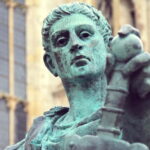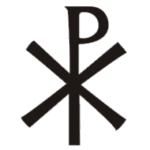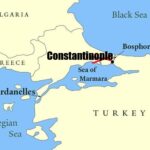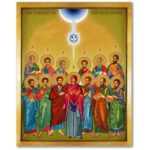So, this is going to be one of those posts where the Catholics aren’t going to like what I have to say. Therefore, I’m going to make a deal with them: if y’all are willing to understand that this is the Orthodox point-of-view and that I’m not asking you to accept it, like it, or agree with it beyond saying “that is what the Orthodox think, we think differently,” then we can do this thing called “agreeing to disagree.” If you’re going to come at me thinking that you can ignore Acts of the Apostles (you can’t), that Rome was the only church Peter founded (it wasn’t), and that letters recognizing the bishop of Rome as first among equals because of Rome’s political importance are somehow saying that he’s Super Bishop and King of All Creation (he’s not), and that I’m going to suddenly change my mind well…
I’ll throw the Golden Gate Bridge in free.
So, as I mentioned last time, Old Rome did not much cotton to this “New Rome” being given the same prominence it had once held now that the seat of government had moved east. When Constantine argued that the bishop of Constantinople should be granted the title of “Patriarch” since he now led the church in the Imperial Capitol, well, that didn’t sit well with Rome. However, it went through because the process of allowing the expansion of the church was not subject to much centralized control (how could it be — this was way before telegraphs, the postal service, steamships, railroads, or anything resembling fast transit). It helped that the church of Constantinople had been founded by one of the Apostles (Andrew) in the first century so it wasn’t like it hadn’t been part of the ancient community.
Now, as I’ve mentioned before, Constantine converted to Christianity. However, back in this era, there wasn’t any solid definition of what it was to be Christian and which teachings from which churches were authentic and correct. There was a lot of heresy and heterodoxy in this era and the Gnostic garbage is probably the most well-known of the lot.
“But what were the Gnostics? Weren’t they the ones with the Real Truth(TM)?”
Well, Timmy, do you know how there are about ten dozen different flavors of Baptist (First Baptist, Southern Baptist, Reformed Baptist, Methodist-Baptist, Primitive Baptist, Evangelical Baptist, Billy Bob’s Baptist BBQ and Casserole…) but there is at least one Baptist church that insists that only its members are doing things correctly and that only its members are going to heaven and that you had to attend it every Sunday and listen only to the sermons of its current pastor and definitely had to pay a certain amount to the church? That Baptist church would be the modern-day version of the Gnostics.
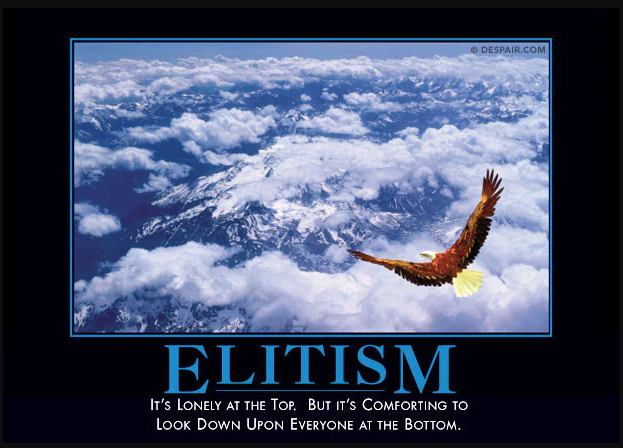
Look, if you doubt me, go read the garbage for yourself. You can find it all for free here. You’ll find that every last one of the so-called Gnostic gospels is some version of “yeah, Jesus told everyone the stuff you read in Matthew, Mark, or Luke but He totally told me the Real Magic and how to become Greater Than God and have Superpower and all you have to do is listen to the guy who says I taught him these secrets and you can be one of the Real Christians.” The handful that aren’t are just personal prophecy that didn’t have jack to do with the church or the people (yeah, a book that says that Anna had a dream that her daughter would marry a king isn’t exactly going to be as useful as the Pauline Epistles when it comes to teaching about Jesus).
I’ll be here with the whiskey and the eye bleach when you get done torturing yourselves.

Back so soon?
Well, settling the teachings of the church into those which were correct (orthodox) and those which were incorrect (heterodox) was part of why there was the First Great Ecumenical Council held in Nicaea in 325 AD. Hosius of Cordoba presided with Emperor Constantine attending just to keep things from getting out of hand (and yes, these councils could and did turn into actual, fist-to-the-face, fights at times). The main issue of contention in the First Council was to settle the issue of Arianism. Now, Arianism wasn’t some tiny disagreement over trifling details like “do we sing the processions in C major or G major?”
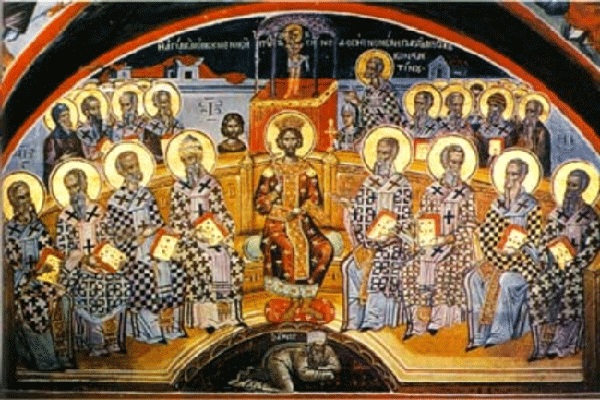
Arianism was a Big Deal. Arians argued that Jesus was not co-equal and co-eternal with God the Father and instead was just the highest creation. This went against what Christ Himself had said and against the teachings from the Apostles that God the Father and God the Son were one and were co-eternal and co-equal. If you argued that Jesus was just a human who God possessed, then why worship Him since Jesus wouldn’t have had much to do with the salvation of humanity? The fights over whether or not Jesus was God (He is) or was just Some Guy got pretty contentious and the First Council tried to resolve the issue (but Arianism would keep cropping up for a while — heck even today there are some Protestant denominations that hold Jesus as the First Creation). Part of this was to say that Arianism (and a lot of the Gnostic writings that supported it) was crap and to establish the Christian Creed (called the Nicaean Creed) to establish what the church actually did believe and teach.
The final list of which books were canonical was not fixed at this Council but most of the Gnostic writings were chucked out as heretical or useless.

So, what was the Nicaean Creed? Well, just about any Christian will recognize the first part of it. The original creed, as set at the First Council of Nicaea said this:
We believe in one God, the Father Almighty, maker of all things visible and invisible;
And in one Lord Jesus Christ, the Son of God, the only-begotten of his Father;
Of the substance of the Father, God of God, and Light of light, very God of very God;
Begotten not made, being of one substance with the Father. By whom all things were made, both in heaven and in earth;
Who for us men, and for our salvation came down [from heaven] and was incarnate, and was made man.
He suffered and the third day, He rose again and ascended into the heavens.
And He shall come again to judge the quick and the dead.
And we believe in the Holy Ghost.
And whosoever shall say that there was time when the Son of God was not, or that before he was begotten he was not, or that he is of a different substance or essence [from the Father] or that he is a creature or is subject to change or conversion, all that so say, the Catholic and Apostolic Church anathematizes them.
Other matters were settled at this council as well such as how to calculate the date for Pascha (Easter) and about how to welcome lapsed Christians back into the church and what steps of repentance they had to take. You can read more about the First Council at Wikipedia, Britannica, or by getting a copy of The Historic Church by Archpriest John Morris.
So, things would rock on for the next few centuries but Rome was getting more and more irked by the loss of their prerogatives and that did not spell peace for the Empire… but we’ll deal with that a lot over the coming posts.
— G.K.












